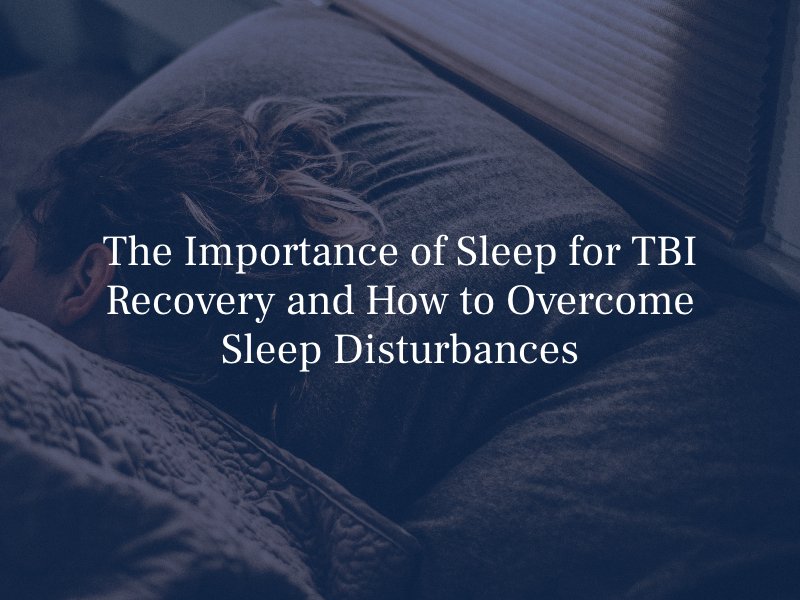The Importance of Sleep for TBI Recovery and How to Overcome Sleep Disturbances
May 25, 2023 Posted In Brain Injuries
Sleep is critical when it comes to traumatic brain injury (TBI) recovery. Adequate sleep not only aids in physical and mental restoration but also plays a vital role in facilitating the brain’s healing process. However, individuals with TBIs often experience sleep disturbances that can hinder their progress.

The Role of Sleep in TBI Recovery
The brain relies on sleep to heal and restore itself, making adequate and quality sleep essential for the recovery process. Here are some specific ways in which sleep impacts TBI recovery:
Promotes Brain Healing
Sleep provides the brain with an opportunity to repair and regenerate damaged cells. The brain consolidates memories, clears toxins, and allows for cellular repair processes to occur, contributing to the healing of the injured brain.
Enhances Cognitive Function
Sleep plays a crucial role in memory consolidation, attention, and problem-solving skills. It aids in the integration of newly acquired information, allowing individuals with TBIs to improve their cognitive function and regain lost abilities.
Supports Emotional Well-Being
Sleep deprivation can contribute to mood swings, irritability, and emotional instability. Adequate sleep helps regulate emotions and reduces the risk of developing mental health conditions such as depression and anxiety, which are commonly associated with TBI.
Common Sleep Disturbances After TBI
Individuals suffering from a TBI often experience the following types of sleep disturbances:
- Insomnia: Many individuals with TBIs experience difficulties falling asleep or staying asleep, leading to insomnia. This may be due to physical discomfort, pain, anxiety, or changes in sleep patterns caused by the injury.
- Hypersomnia: In contrast to insomnia, some individuals may experience excessive sleepiness during the day, known as hypersomnia. This can disrupt daily activities and negatively impact overall functioning.
- Sleep-wake cycle disruptions: TBIs can disrupt the body’s natural sleep-wake cycle, resulting in irregular sleep patterns. Individuals may experience fragmented sleep, frequent awakenings during the night, or daytime sleepiness.
Strategies to Overcome Sleep Disturbances
Here are some effective strategies to address sleep disturbances caused by TBI:
A Consistent Sleep Routine
Set a regular bedtime and wake-up time, even on weekends. A consistent sleep schedule helps regulate the body’s internal clock and promotes better sleep quality.
Create a Sleep-Friendly Environment
Make sure your bedroom is quiet, dark, and at a comfortable temperature. Consider using earplugs, eye masks, or white noise machines to eliminate disruptive factors.
Practice Relaxation Techniques
Relaxation exercises before bedtime, such as deep breathing, meditation, or gentle stretching, can help calm the mind and prepare the body for sleep.
Limit Stimulants
Avoid consuming caffeine, nicotine, and alcohol close to bedtime. These substances can disrupt the sleep cycle and lead to increased wakefulness during the night.
Manage Anxiety and Stress
TBI recovery can be emotionally challenging. Engage in stress-reducing activities like journaling, talking to a therapist, or practicing mindfulness to alleviate anxiety and promote better sleep.
Consult a Healthcare Professional
If sleep disturbances persist or significantly affect your daily functioning, consult a healthcare professional experienced in TBI management. They can provide personalized guidance and recommend appropriate interventions or therapies.
If you or a loved one has suffered a traumatic brain injury, our traumatic brain injury lawyers in Riverside can help.